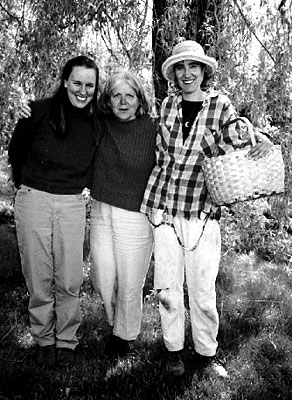 |
| Avena Institute board members Shelly Ubbelohde (left) and Bonnie Rukin-Miller (center) are like good compost for the Institute, helping it grow and flower. The educational Institute grew out of the herb business, Avena Botanicals, started by Deb Soule (right). English photo. |
By Jean English
Bonnie Rukin-Miller, chair of the board of Avena Institute, reads a quote from gifted “wise woman” M.C. Richards, who was a writer, potter, and progressive thinker connected with the anthroposophical movement until her death three years ago. From Richards’ book Crossing Point, Rukin-Miller reads: “… knowing that autumn is really a form of spring, when the plants sow their seeds, and winter is part of it too, everything is hatching underground and getting ready for the ascent into the visible world, and isn’t it too about remembering what we know very well, namely, that things are going a long time before they’re visible, and a long time after …”
This is something that farmers and gardeners know well. Whether we anticipate quickly sprouting bean seeds; longer germinating parsley seeds; nut pine seeds that need a long, cold, moist winter before germinating; or beech trees that slowly send suckers out in circles to form rings of majestic trees, we know the magic of the invisible becoming visible in the world of nature.
So it is at Avena, where founder Deb Soule is like the parent beech tree whose roots have extended outward and are now sprouting new endeavors. Though connected to, closely related to and long nurtured by Soule and her herbal apothecary business, Avena Botanicals, these endeavors now have lives of their own. One such thriving offshoot is Avena Institute, the herbal and healing arts teaching center that propagates and extends the goals Soule had when she started Avena Botanicals.
Soule started her business in 1985, with a vision that she wanted not only to produce therapeutic medicinal herbs and their products, but that she also wanted to teach other women how to grow and use these herbs. For many years she was doing all of that, with some hired help but primarily on her own. Raising and harvesting plants; preparing and marketing tinctures, salves and other products; teaching; consulting – Soule wore many hats.
The teaching led to the formation of Avena Institute, a nonprofit teaching center. After receiving a generous gift from Katey Branch and Alan Day, Soule was able to purchase a 19th-century farmhouse in West Rockport, Maine, with 32-acres of verdant, rolling fields and woodland. Avena Botanicals moved to the site soon after, and the first board meeting of Avena Institute was held, with Soule, Stephen Huyler, Dee Webster, CR Lawn, Suzy Ellis and Betsy Hart. That same year, the Avena Botanicals Public Medicinal Herb Gardens were opened. The gardens provide ingredients for Avena Botanicals’ products and serve as outdoor classrooms for Avena Institute students.
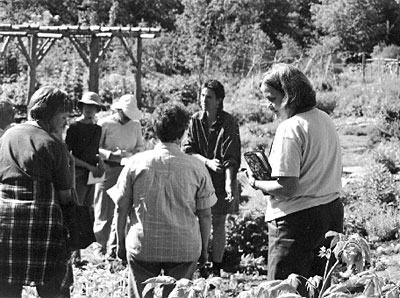 |
| Soule leads an educational tour of Avena’s Gardens. English photo. |
The Institute, a 501(c)(3) nonprofit organization, is run by a six-member board. Part-time office manager Linda Côté-Small is the only paid staff person of the Institute. All other work – programming, site maintenance, marketing, outreach and fundraising – is done by the board. Rukin-Miller credits others with helping develop the Institute: former board members Paula Clough, Dee Webster, Cheryl Evangelos and Jeannie Dissette; along with Roxanne Wells, who was office manager for a year until she retired in December. Current office manager Côté-Small managed Rising Tide Co-op in Damariscotta until coming to Avena, bringing “valued skills to help us move into our next developmental stage,” says Rukin-Miller.
As the Institute brochure states, it offers “programs primarily for women that promote complementary health approaches emphasizing medicinal herbs and food, organic and biodynamic gardening, and a deeper understanding of the natural world. It is a place where plants and people from varied traditions come together to teach, to heal and to learn.” Its keystone course is the Women’s Medicinal Herb Foundation Course, a four-weekend course spanning the growing season in which participants study over 120 medicinal herbs in the beautiful, peaceful, 1-acre herb garden. The course is taught by Soule, and provides an in-depth offering, teaching students how to grow herbs and prepare infusions, decoctions, tinctures, flower essences, oils, and more; how to use herbal first aid; boost the immune system; preserve endangered medicinal plants; identify wild plants; understand the politics of food; give back to communities; link plants and dreams; and much more. Thirty students are enrolled in the Foundation Course this year, and the waiting list for next year is filling. “The interest is clearly there,” says Rukin-Miller.
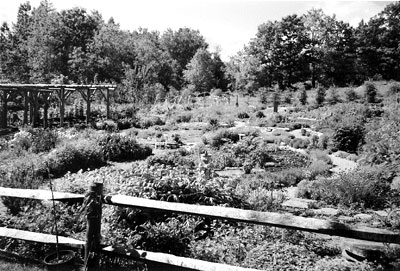 |
| Good light, well drained soil, and superb soil preparation help the herbs at Avena grow. English photo. |
Other courses are shorter but equally enticing. From “Creating a Handmade Tincture Bag” in early February to “Women in Winter: The Journey Inward” in November, participants can spend anywhere from an hour to several days learning about medicinal herbs for families (even pets); finding the significance of dreams; creating a “no dig garden” using techniques of permaculture and biodynamic gardening; enjoying an herb garden walk; attending a retreat to nourish their spiritual lives; cooking macrobiotic meals; or finding out how to prevent and treat cancer using naturopathic approaches. And more …
Events range in price from free (the garden walks) to $875 for the intensive Foundation Course. “We’ve extended our course offerings, trying to reach out to the public with the variety of subjects that are of interest and to extend the pool of instructors,” says Miller. In addition to Soule, instructors include acupuncturist Laura Barnard; naturopath Celeste Bonde; gardeners Carol Brennan and Julia and Charles Yelton; registered Maine Guide and meditation instructor Anne Ryugin Dellenbaugh; biodynamic farmer Tom Griffin; cultural anthropologist Stephen Huyler; astrologer and herbalist Kwah Wa’adabi; and others.
Nourished Board Member
Board member “extraordinaire” (according to Rukin-Miller) Shelly Ubbelohde is an inspirational example of how the Institute can help someone and how that person, in return, can give back to the Institute. Once utilizing her business degrees as a stock trader in Metropolitan Detroit, then working as a massage therapist, Ubbelohde and her husband later moved to an off-the-grid home in Palermo to live a more sustainable life than they had in Detroit. “One of the reasons we live in Maine,” says Ubbelohde, “is because of MOFGA. We couldn’t believe it when we moved here, that such a thing could exist. We went to the Common Ground Fair – It’s absolutely shocking. When people complain about Maine, they don’t realize that this doesn’t exist elsewhere.
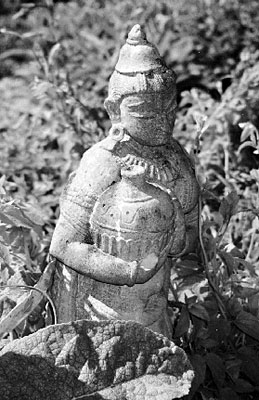 |
| Statuary lend a meditative atmosphere to the garden. English photo. |
A note about scholarships in the Avena Institute brochure caught her eye. She applied for one, got it, attended a weekend course for women, and another, “Nourishing Our Spiritual Lives.”
“The classes were completely life changing,” says Ubbelohde. “It’s just an amazing experience being in a class here.” She was so grateful, she told Soule that she wanted to give something back to Avena. “I was willing to do whatever,” she says. “I’d even clean out the composting toilet, because I was so grateful for the experience.” Beyond actually learning about herbs and health, Ubbelohde valued the nurturing she received during the courses. “You get fed all this amazing organic food [cooked by Missy Hatch and Julia Yelton]. They bring you these nasturtium blossoms stuffed with organic cream cheese and maple syrup, and you’re eating these blossoms and you’re just sitting here saying, ‘Where am I?’ There are all these amazing women, and they’re singing songs and they’re singing to the plants, and they’re harvesting herbs, and you just think, ‘Wow!’ It’s very hard to try to describe the impact that that can have on a life; that you can come to a class and you’re fed and have a comfortable place to be, and you have people who are really concerned about you and ask, ‘How are you doing?’ ‘Do you need some tea?’ If you’re in the garden, ‘Do you need a hat?’ They have the little comfy chairs for you to sit on under this willow tree. It’s just very nurturing and nourishing. It’s like going to the Common Ground Fair, life affirming. When we drive up to Common Ground Fair, we see people and they say, ‘Hi, how’s it going? I got my cool tee-shirt…’ That’s what it’s like. You think, ‘Wow, there are people who are really compassionate and care about the earth.’ It’s very inspiring. That’s why I said I’ll clean the composting toilet.”
She believes that the rural nature of Maine often creates pockets of women who feel very isolated but would benefit from knowing about Avena. “It’s inspiring for me to know that I don’t have to wait until the [Common Ground Fair]. I can come here. It’s a good clearinghouse for information. You find out when the South African Songoma healer is going to talk; when the 100-year-old Qigong therapist from China is coming in. It’s really cool to be here because there is a lot of information and Deb knows a lot of people.”
Cleaning the composting toilet seems small fare compared with what Ubbelohde has taken on. Not only is she a board member now, but she is using her business background by serving as treasurer of Avena Institute. She explains that the Institute is funded “50% from classes. We raise the other 50% – a portion from membership; from grant writing; and a huge portion from private giving, donors, foundations. We’re hoping to increase the amount from courses and are moving in that direction.”
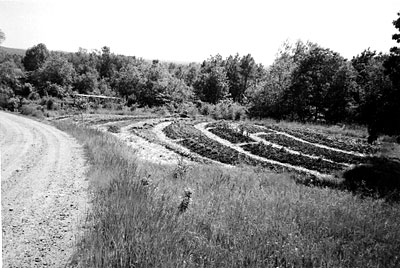 |
| A new garden at Avena is designed and has been prepared according to the principles of permaculture. English photo. |
The courses now extend over 10 months, thanks in part to the yurt, where students gather during inclement weather. The board dreams of having a year-round teaching facility, possibly renovating the solid, four-story barn into a place with classrooms, offices, treatment rooms, ritual space, a dormitory and library. Meanwhile, the farmhouse is used for small classes, although for most classes “we have clearly outgrown that space,” says Rukin-Miller. The yurt holds 25 or, at its limit, 30 students. Heating the yurt and/or using community facilities may enable the Institute to expand its offerings even more until (and if) the barn is renovated.
Another dream is to develop a three-year Community Herbalist program. “We have a number of students already expressing interest in it,” says Rukin-Miller – students with considerable basic knowledge about herbs who want to know more. “That would be a program that trains people to be community herbalists working in partnership with primary care practitioners, particularly in underserved areas in rural Maine. These people would partner with medical doctors, osteopaths, acupuncturists, naturopaths … Deb has worked some in this way, offering consults with Dirk Vandersloot, who is an M.D. and a homeopath.”
Beyond Medicine
Bonnie Rukin-Miller sees the Institute going far beyond its focus on medicinal herbs and women to include “the interconnectedness of the web of life that includes food, medicine, sustainable practices in land use.” A long-time MOFGA member and past president of MOFGA, and a current board member of Maine Initiatives, as well as owner of the organic Sand Hill Farm, she brings vast expertise to the Avena board. “The lure for me,” she says, “is around growing healthy plants, healthy food, healthy people, healthy organizations, healthy communities. Sustainability in the realm of organizational work has been a building passion for a long time. I credit MOFGA with confirming that for me and giving me the opportunity to serve in many ways in the formative times of the organization.”
Rukin-Miller represented Avena Institute at the HerbFest, held at MOFGA’s site in Unity in June. She was moved “to sit on Sunflower Common on a beautiful afternoon” and to be “aware that there were young children of the next generation running playfully and safely there, being held by everyone at that event; and that they were running on the earth, in the sunshine, on a piece of land that had been dream material for that organization for many years. And now it’s almost seemed matter of fact that other organizations hold their special events there, and that this is a viable place. I was very moved by having been part of that process and to know that those dreams have sustainability and longevity with a wide variety of people coming and going over the years who believe in it and are committed to continuing that vision.”
Working with Avena Institute is unique for Rukin-Miller, because she is working closely with the founder – Soule – who is the visionary and is “still actively part of the vision and the work to grow that vision.” One goal in her work is to make sure “everyone thrives, not just the plants, but the people – what they like to do and what they do best.” She enjoys working with Soule – ”who has typically worn multiple hats beyond number – to begin to make her roles clear so that she can find the balance in her work with Avena.” Rukin-Miller sees Soule’s wisdom ever increasing as she ages and hopes that Soule will be able to take even more time to be with the earth, with growing plants, with people, in order to continue the “blossoming” and “ripening” of her vision. She quotes M.C. Richards again: “No question is the last, no answer is the last. Unfolding, unfolding. It takes our lifetime to learn what our changing needs are and how to relate to them. Life is not an achievement course, it is a continually changing insight. Nothing fails like success, because success is quickly obsolete, the goal once satisfied changes. In every practical solution there must be growing points. All living organisms have one…”
Bringing in other teachers will take some of the educational pressure off of Soule, says Rukin-Miller; will add to the knowledge available at Avena; but at the same time will “honor the distinctive and artistic way in which Deb conveys information, the magic and inspiration she brings, and her history in this place. As a board, we are encouraging the blossoming of the whole and the parts within, and extricating Deb from the parts she doesn’t have to manage.”
Another goal of the board, says Rukin-Miller, is to make the public more aware of Avena Institute, because “as soon as the public comes here, there is a connection that they make with mind, body and spirit that does not have to be stated. Yet to state it in an artistic way enhances the experience and brings people into the group” and enables them to understand “what their contributions may be on all levels, whether making a butterfly box for the gardens or helping to build an arbor or learning from a class to go home and care for themselves and their families in holistic ways …”
Garden Girls
On one Saturday each month, from 8 a.m. to 4 p.m., girls ages 12 to 17 are welcome to come to Avena Institute to participate in social action projects and lifestyle skills activities. Girls needn’t come to each session; the group varies in makeup considerably. The girls determine the direction of the program. “We always do an herbal project. We made herbal deodorant; a “teen tonic,” an iron tonic with yellow dock roots; we’ve done a face cream. This month we’re going to do sun tea and infuse an oil; in August we’ll make it into lip balm with different natural colors. The program is free for the girls, thanks to a grant from the Maine Women’s Fund. Board member Jan MacDonald has been a big part of the program, letting the girls raise plants at her Barley Joe’s Greenhouse in Warren and meet in her home during the winter.
A Relaxed Soul
“It’s a relief to have Bonnie and a great board of directors,” says Soule, “to help hold all the educational programs. I’m happy to share the load and to be able to do what I’m really good at – to be in the garden and teach and write.” She’s excited about the Garden Girls project, in particular, and about the growing awareness that the public has about Avena.
“There’s a place the public can come and have more of a relationship with plants than just in a little tincture bottle or a bottle of pills,” Soule continues. “Plants feel like ‘a way in.’ When people have a way in, I think they begin to have a way to [understand] the whole ecosystem of the earth.”
As you sit in a comfy chair under the embracing foliage of a massive weeping willow, birdsong filling the air about you; as you look out over the masterfully designed herb garden with its meditative Buddha and Tara statues here and there, you connect with nature in a way that remains with you and takes root in your own home and garden – and you comprehend the Wordsworth quote in the Institute’s winter newsletter: “Nature never did betray the heart that loved her.”
For more information about Avena Institute programs, please call the office at 594-2403, or check the website at www.avenainstitute.org, or email [email protected]. For information about Avena Botanicals’ Medicinal Herb Gardens and Apothecary, please call 594-0694.
Julia and Charles Yelton have brought the practice and lessons of permaculture from the permaculture village where they lived in Australia, and from
their extensive travel and work in different communities worldwide, including in Nepal and India, to Maine. They have built a home here and, two years ago, started teaching at Avena, where Julia is also a gardener. She defines permaculture as “all aspects of self-sustainable living that will perpetuate a culture, hence ‘permaculture’.” Instead of degrading the planet, she continues, permaculture helps to aid the planet. “It’s not just gardening.”
The expanded portion of Avena’s Gardens shows the permaculture influence. Beds have been sculpted to fit the contour of the hill, “which naturally presents a design,” says Julia. In addition, it conserves water, even on a slope, and creates different environments (wetter and drier, for example) where various plants will thrive. The beds include plants needed by Avena for its products, as well as such plants as comfrey, nettles and valerian, which help build soil and are added to compost and compost tea.
This new garden was reclaimed from invading weeds (such as raspberries) with sheet mulch put down a year ago. In this method, manure and compost are spread “depending on how heavy a mat you need,” and they are covered with either heavy cardboard, if you have a year to wait, or newspaper, if you’re going to be planting right away. Compost and seaweed are placed on top of the cardboard or newspaper, then straw is added.
“I do like to get across,” says Julia, that permaculture is “integrating gardens, dwellings, water systems … everything working together … greenhouses … so that the whole property can be designed initially and then you build upon that design.” Julia and Charles have taught such methods at classes at Avena Institute. Now they believe that enough people have sufficient interest that they hope to offer the full, 72-hour design course.
